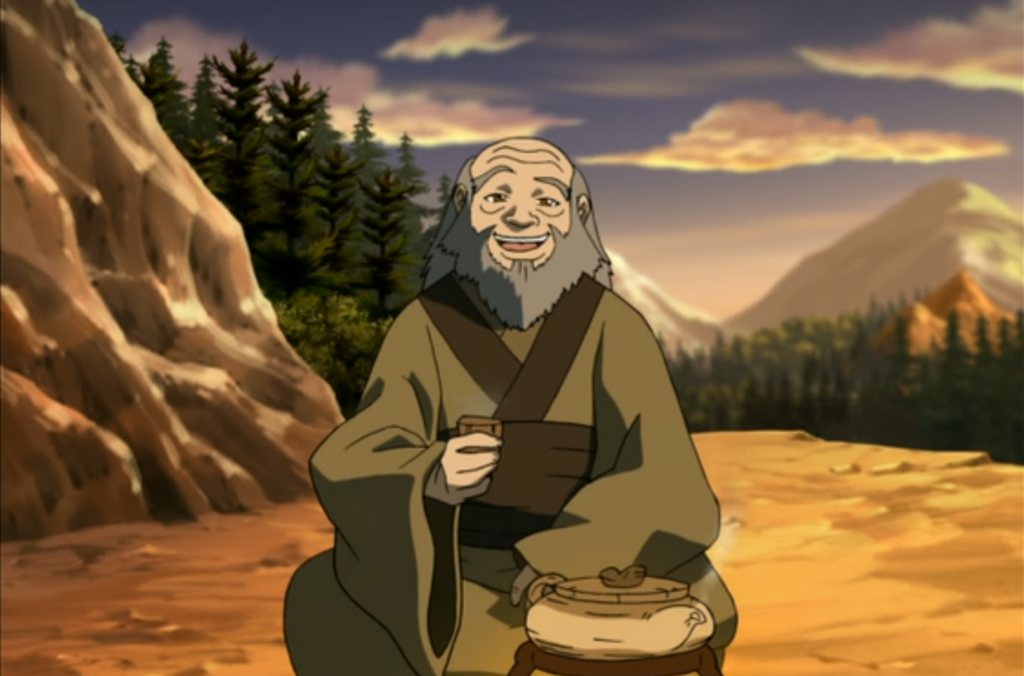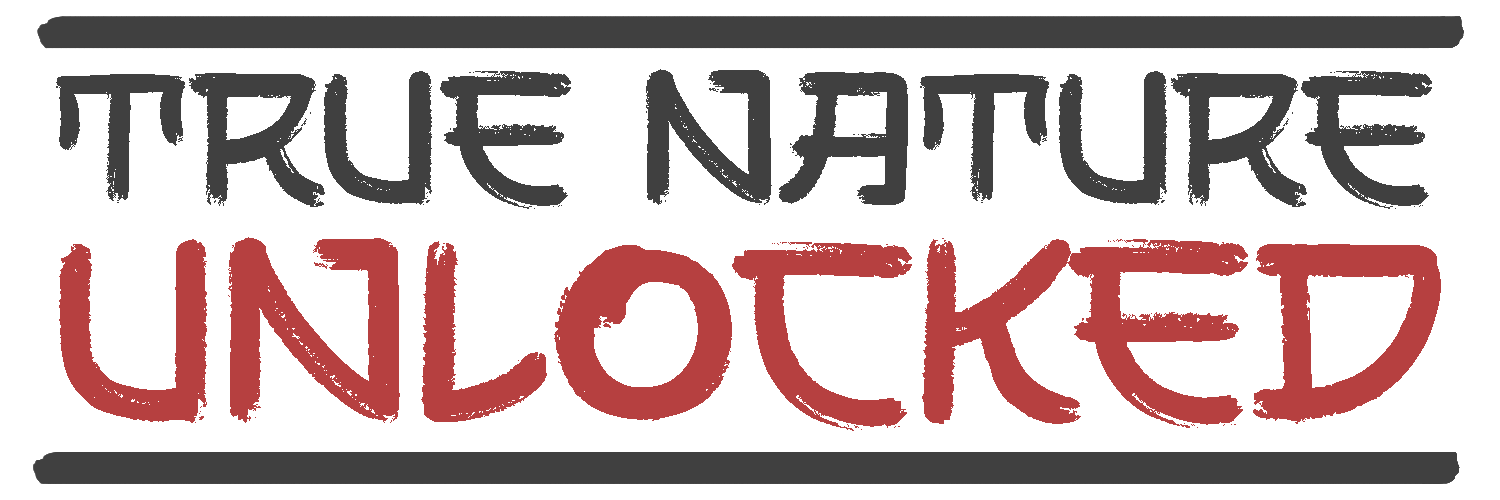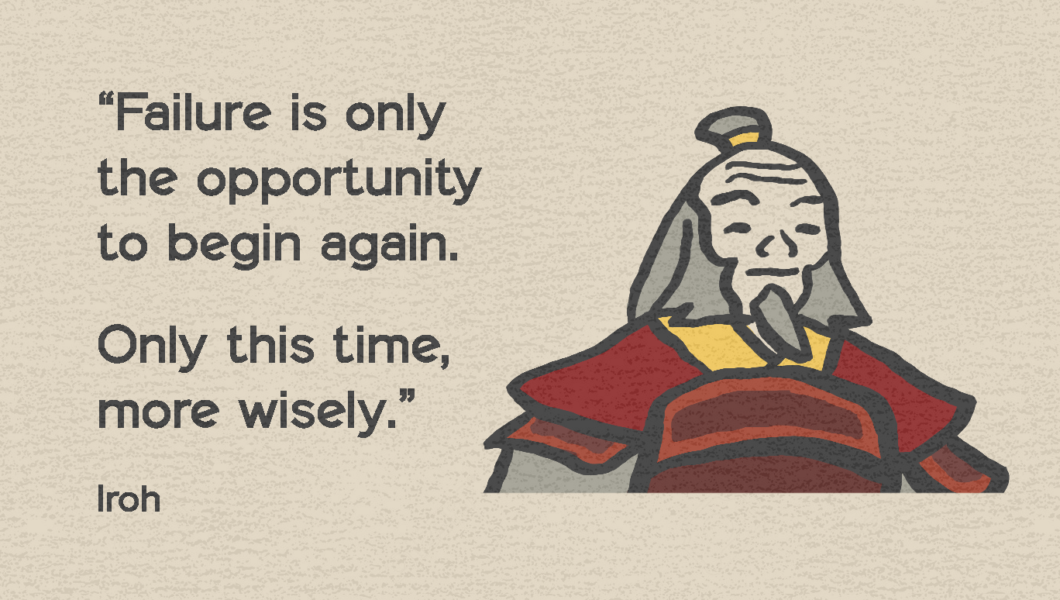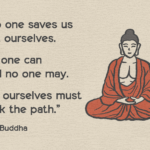Avatar: the Last Airbender’s Uncle Iroh is easily one of my favorite fictional characters. He’s likable, funny, human and flawed, but he’s also wise, strong and compassionate. He’s a mentor figure many of us might wish we had growing up.
It’s rare to find such a special character in a cartoon that was written for children. But Avatar: The Last Airbender is not just any cartoon. Viewers of all ages love it for its immersive setting, rich characters, and exciting story that explores timeless themes.
For many people, Iroh is among the best characters in the show, and he’s the source of many of the most memorable quotes and life lessons. Let’s delve into the life of this tea-loving firebender, and explore what makes him such a remarkable role model.
Spoiler warning: We’ll be discussing key plot points from the series.
Who is Uncle Iroh?
Iroh is a fictional character from Nickelodeon’s animated series Avatar: The Last Airbender, created by Michael Dante DiMartino and Bryan Konietzko. He’s voiced by Mako Iwamatsu in the first two seasons and Greg Baldwin in the third season after Mako’s unfortunate passing.
Iroh is a retired general of the Fire Nation and the elder brother of Fire Lord Ozai, the series’ primary antagonist. At the start of Book 1 (season 1), he is traveling with his nephew, the exiled prince Zuko, who hopes to capture the Avatar in order to win back his father’s favor and return as the prince of the Fire Nation.
Iroh is introduced as a funny, laid-back, tea-loving uncle. His initial appearance might make you think he’s just an old man enjoying his retirement, but as the series progresses, it becomes clear that he is much more than that. He was once a formidable general of the Fire Nation, famously known as the Dragon of the West, and was next in line to be Fire Lord before he stepped aside for his younger brother, Ozai. Iroh’s past is marked by tragedy, particularly the death of his only son, Lu Ten, during the Siege of Ba Sing Se. This event changes him, leading him to abandon his ambitions of conquest and focus on spiritual growth and wisdom.
It is important to draw wisdom from many different places. If we take it from only one place, it becomes rigid and stale. Understanding others, the other elements, and the other nations, will help you to become whole.
— Iroh

What makes Iroh a role model, and what can we learn from him?
Iroh is not your typical warrior, nor is he a typical comic relief character. Let’s break down why he stands out and what makes him such an exceptional role model:
Wisdom and spirituality
The most obvious character trait that makes Iroh stand out is his wisdom. He’s deeply spiritual, often offering philosophical insights about his knowledge of the elements, his understanding of balance, or his belief in the interconnectedness of all things. There are many scenes in which he helps other characters who are lost, by saying just what they needed to hear in that moment.
In the darkest times, hope is something you give yourself. That is the meaning of inner strength.
— Iroh
He helps other characters understand what it means to be strong, to have courage, but also to stop and enjoy the little things in life.
In the episode “The Tales of Ba Sing Se,” we see him advising a troubled young man to follow his heart rather than succumb to crime, even though the man just tried to rob him. Iroh’s calm demeanor and gentle guidance not only help the young man but also reflect his own journey of finding inner peace.
While it is always best to believe in oneself, a little help from others can be a great blessing.
— Iroh
Humor and lightheartedness
Despite his wisdom and strength, and the depth of his grief, Iroh is often a source of humor and lightheartedness. We can see his humor in many episodes, whether he’s making light-hearted jokes or having playful conversations with strangers. His lighthearted nature and love of jokes make him an endearing character who can bring a smile even during difficult times.
Iroh’s love for tea is more than just a quirky character trait; it symbolizes his appreciation for life’s simple pleasures. He is often able to stay calm and find peace in the midst of chaos. Whether he’s brewing a pot of jasmine tea, playing a game of Pai Sho, or enjoying a quiet moment of reflection, Iroh shows us how to find joy in the little things.
The key to wisdom and tea is proper aging.
— Iroh
Compassion and kindness
Even though Iroh used to be a general of the Fire Nation, and is technically at war with other nations, he consistently shows kindness to others, regardless of their nation or background. He befriends strangers, helps those in need, and always offers a listening ear.
His relationship with his nephew Zuko demonstrates his loyalty, compassion and patience. Despite Zuko’s anger and often misguided actions, Iroh remains a steady source of support, guiding him with gentle wisdom rather than force.
One of the most touching moments in the series is when Iroh mourns his son’s death on the anniversary of his passing. This scene, accompanied by the song “Leaves from the Vine,” highlights Iroh’s deep capacity for love and grief. He has helped others, but expresses that he wishes he could have helped his son. It shows us that despite his wisdom and strength, he is human, flawed and vulnerable like all of us, and he is deeply aware of it. This gives him the ability to turn personal grief into empathy for others.
Sometimes, the best way to solve your own problems is to help someone else.
— Iroh
Humility and self-awareness
Despite his status and past achievements, the Iroh we see is humble and self-aware. His wisdom and compassion are a result of personal trials and past mistakes. As a younger man, Iroh was a formidable general known as the “Dragon of the West.” His ambition led him to lay siege to the Earth Kingdom city of Ba Sing Se, a campaign that lasted 600 days and ended in failure. This defeat was made worse by the tragic death of his son, Lu Ten, during the siege. These events led Iroh to reassess his values and priorities, which helped him become the character we see in the show.
Iroh’s transformation from a war-driven general to a peace-loving mentor shows us the power of growth and redemption. He acknowledges his mistakes, learns from them, and uses his experiences to guide Zuko away from a path of vengeance and aggression.
Pride is not the opposite of shame, but its source. True humility is the only antidote to shame.
— Iroh
Mentor and guide
Iroh’s role as a mentor extends beyond his relationship with his nephew Zuko. Throughout the series, he offers guidance to other characters as well, always with wisdom and a gentle touch. He has the ability to see the best in people and to encourage them to realize their potential.
Sometimes life is like this dark tunnel. You can’t always see the light at the end of the tunnel, but if you just keep moving, you will come to a better place.
— Iroh
A memorable example of this is his interaction with Toph in the episode “The Chase.” When Toph runs away from her friends, feeling misunderstood, she encounters Iroh. This moment of connection helps Toph see her situation from a different perspective and ultimately reunites her with her friends.
You sound like my nephew, always thinking you need to do things on your own without anyone’s support. There is nothing wrong with letting people who love you help you. Not that I love you. I just met you.
— Iroh
Positive masculinity
Iroh represents a healthy, mature and balanced form of masculinity. He’s strong and knows the value of strength and training, but he’s also patient, humble and compassionate. Iroh’s masculinity isn’t about dominance or aggression; it’s about balance, wisdom, and kindness. He is a man who shows vulnerability, and who understands the value of listening and learning.
He defies the stereotypical image of a warrior. He enjoys simple pleasures like tea and Pai Sho, often appearing more like a kindly old man than a fearsome general. Yet, when the situation demands it, he fights for what he believes in and demonstrates incredible strength and skill.
I know what you’re going to say. She’s my sister, and I should be trying to get along with her.
— Zuko
No, she’s crazy, and she needs to go down.
— Iroh
Balancing duty and morality
Iroh’s life is a testament to the struggle between duty and personal morality. As a former general of the Fire Nation, he has seen the horrors of war and the consequences of blind obedience. His decision to leave his position and reject his nation’s imperialistic ambitions illustrates his commitment to his own moral compass.
The Iroh we see in the show chooses justice and peace. He finally resists the Fire Nation’s conquest and decides to support the Avatar. He refuses to let duty override his sense of right and wrong, showing us the importance of staying true to our values, even when it’s difficult.
Protection and power are overrated. I think you are very wise to choose happiness and love.
— Iroh
Resilience and growth
After the loss of his son, Iroh transforms from a fierce general to a wise, compassionate mentor. He demonstrates that it’s never too late to change and that our past does not define us. He has been able to find peace and purpose even after such a devastating loss.
As a mentor, he helps his nephew grow and discover what is truly important to him and what he believes in. Initially, Zuko is consumed by his quest to capture the Avatar and restore his honor. Iroh patiently guides him, with his unwavering belief in Zuko’s potential, planting seeds of wisdom that eventually lead Zuko to question his path. When Zuko finally decides to follow his own destiny rather than the one imposed by his father, it’s a triumphant moment for both of them.
It’s time for you to look inward and start asking yourself the big question: Who are you, and what do you want?
— Iroh
Forgiveness
Despite the pain caused by his brother Ozai and the Fire Nation’s actions, Iroh harbors no ill will. He focuses on healing and moving forward, rather than dwelling on past wrongs.
Iroh’s forgiveness is most clearly displayed in his relationship with Zuko. Even after Zuko betrays him and aligns with his sister Azula, Iroh welcomes him back with open arms when Zuko seeks redemption. This act of forgiveness is not only a testament to Iroh’s love for Zuko but also a lesson in letting go of anger and resentment.
I believe people can change their lives if they want to. I believe in second chances.
— Iroh
The legacy of Uncle Iroh
Iroh’s legacy extends beyond the confines of the series. Many fans of Avatar: The Last Airbender have shared stories of how Iroh’s wisdom has helped them through difficult times. His teachings on balance, compassion, and resilience have resonated with people of all ages. So, next time you brew a cup of tea, take a moment to reflect on Iroh’s teachings and remember that “Sharing tea with a fascinating stranger is one of life’s true delights.”


